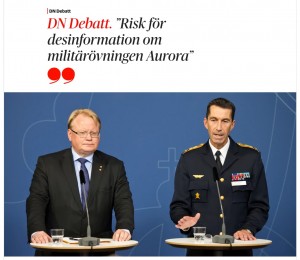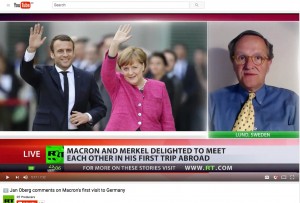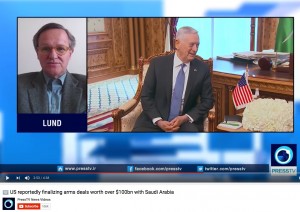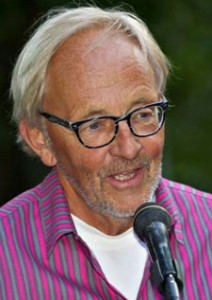Archive for May, 2017
Trump’s historically catastrophic speech in Riyadh
TFF Live
An intro to TFF PressInfo # 414 A & B
TFF PressInfo # 414 (B): Trump in Riyadh – A Gulf NATO to gang up against Iran and Syria
By Jan Oberg
The role – again – of marketing companies in selling wars
Few wars have been so thoroughly media-managed and marketing-loaded as that on Syria. No wonder arms deals are too – otherwise citizens around the world would protest loudly that their tax money is spent on destruction and more destruction and all the promises of the past that this – or that – arms deal will increase security and peace in the world have turned out to be fake information – disinformation – and an integral part of what can only be termed “fearology” by governments against their own people.
One must therefore welcome Russia Today’s excellent research by Alexey Yaroshevsky also on this dimension.
This report is high-speed but listen carefully to it as it points out two US companies associated with this deal and US-Saudi relations with questionable image – a report that also highlight to some extent the roles of both Bill and Hillary Clinton in all this: the Qorvis MSLGroup and Burson-Marsteller.
In passing one cannot but deplore that it is Russia Today, not its Western peers, that does the research on the role of PR and marketing firms.
NATO in Gulf with Denmark as a liaison?
Back to NATO in Kuwait and what it may mean.
Here is what the United Arab Emirates’ daily The National reported on January 24, 2017. Interestingly, Kuwait, Qatar, Bahrain and the UAE are members of ICI – the Istanbul Cooperation Initiative – while Saudi Arabia and Oman plan to join. This is exactly the coalition we have mentioned above.
Three days later the same sources quotes the Danish ambassador in the UAE: “Nato officials are expected to visit in coming months after the Danish embassy in Abu Dhabi becomes the country’s go-between with the bloc, said Merete Juhl, the Danish ambassador. Read the rest of this entry »
TFF PressInfo # 414 (A): Trump in Riyadh – A Gulf NATO to gang up against Iran and Syria
By Jan Oberg
Today, I am proud to say that NATO has a new home in the Gulf region. And that we have opened a new chapter in our deepening partnership.
NATO S-G, Jens Stoltenberg, in Kuwait on January 24, 2017
The Secretary-General also said this new home’s “potential is enormous”.
President Trump arrived on his first trip abroad to Saudi Arabia on May 19, 2017 and big things are supposed to happen, including Saudi Arabia presenting itself as a innovative, visionary leader of the region.
His visit must be seen in the light of a number of events and trends, and in what follows we do like the military when it scans the horizon for enemies: we look for patterns – not the least Saudi Arabia’s “surprising new military goals” as Forbes’ Ellen Wald appropriately calls them.
Or, as they say – we connect some dots that, invariable, Western mainstream media have no capacity and probably also no interest in connecting.
This pattern consists of at least these events and long-term trends:
1. The broadening of NATO cooperation with Gulf countries – one may even see a Middle Eastern NATO branch emerge.
2. Saudi Arabia’s evident leadership in building a new multi-national army announced a couple of years ago and allegedly having 100.000 troops as a goal. This is an extension of the Gulf Cooperation Council’s and its old to-be-replaced military arm, the Peninsula Shield Force
3. The intensified image in the US under Trump of Iran as a threat and a ‘ganging up’ against it.
4. The war on Syria’s territory with hundreds of foreign conflict participants including NATO country Turkey and allies such as Saudi Arabia, the Gulf States and NATO members such as England and France – all in support of anti-government/regime change and pro-terrorists.
5. The second Cold War – very different from the first – between NATO and Russia which also has a Middle East dimension in that Russia is a vital partner of the Syrian government and the Syrian Arab Army.
6. The conflict formation that has Israeli as it’s centre – Hezbollah, Iran, Syria (the Golan Heights), etc. If you want to know what Israel wants to use Trump’s visit for it’s clear from this analysis: More confrontation with Iran and cooperation with Saudi Arabia, also concerning Syria.
7. NATO’s obvious crisis – the new Cold War around Ukraine; its second largest military member, Turkey, working closely with arch enemy Russia, ongoing trans-Atlantic conflicts about burden sharing etc.
This will suffice as an illustration of the complex web of inter-connected issues. There are surely more and we can’t go through them all in this short article.
By way of introduction it should be mentioned that NATO has, as alliance, been engaged in the Middle East for a long time – through the Mediterranean Dialogue begun in 1994 and “elevated” to the Istanbul Cooperation Initiative ten years later in 2004.
What’s going on now is, however, on a quite different scale.
The US-Saudi Arabia arms deal
The US and Saudi Arabia are to sign a huge – yet another – arms deal, valued at US$ 110 billion and, over a ten-year period perhaps mounting to as much as US$ 300 billion. It’s been facilitated by Trump’s son-in-law, Jared Kushner in a rather unconventional way.
Given that Saudi Arabia is the world 3rd largest military spender – i.e. directly after the US and China and, thus, bigger than Russia – this project must be seen in the realm of irrational militarism outside any domain of policies for peace in the Middle East.
And it’s important to keep proportions and priorities clear in these affairs. OECD’s Development Assistance Committee (DAC) spent more than $135bn (£90bn) in 2015 – i.e. the world’s richest countries give about half of the value of this single arms deal to help poor countries manage and eradicate poverty.
It is a clear example of the vested interests of the Military-Industrial-Media-Academic Complex (MIMAC) that threatens the very survival of humanity and is way beyond democratic control. Western mainstream media’s very subdued coverage of this – extreme – dimension of US foreign policy in general makes them complicit and justifies their inclusion in the MIMAC concept.
It goes without saying that this deal is marketed to the world as promoting stability, security and peace and as an important element in the global War On Terror. Given all the other weapons that have been pumped into the Middle East region the last 4-5 decades and all the countries that have been more or less turned into ruins – it’s quite obvious why, as usual, there is no intellectual connection between this deal and the said goals.
For NATO and the mantras, media and marketing is everything.
Russia Today has done a rather decent piece of research on this (see below). Among other things, it makes clear that the deal includes weapons that have little, if anything, to do with fighting terrorism. One of them is the Terminal High Altitude Area Defense (THAAD) missile defense system from Lockheed Martin that the US is also stuffing down the throat of South Korea.
To be able to win war, not to prevent them.
If for a moment one applies some kind of security political logics to this deal, it’s obvious that this build-up is directed – in the longer term perspective and with Israeli support, one must assume – against Iran and Syria. Israel’s official view is expressed here – official because otherwise this minister would have been fired for such statements.
The military expenditure “correlation of forces”
Military expenditures is not the only measure of military might. Neither is it an indicator of who would win a war; contemporary history is full of examples of big spenders losing wars when attacking countries with smaller military budgets.
That said, if you do a search on “world military expenditures” you’ll get a sense of who is willing and able to invest in the military and, also, a rough measure of both proportional allocation to the military sector and, above a certain level, an index of on dimension of militarism.
There are indexes by SIPRI and by the IISS and others – and here are the rough ‘correlation of forces’ pertaining to the countries we talk about here:
• Saudi Arabia is the 3rd or 4th largest military spender on earth after the US, China and perhaps Russia.
• Saudi Arabia spends about between US$ 64 and 82 billion annually (depending on source you consult), growing 20% per year and that is the extremely high 10 % of its GDP. Read the rest of this entry »
Försvarsministern, ÖB och informationen
Av Erni & Ola Friholt
TFF Associates
Försvarsminister Peter Hultqvist och ÖB Mikael Bydén hävdar i sin DN-artikel den 15 maj att det finns uppenbar risk för påverkans- och informationsoperationer i anslutning till höstens militärövning Aurora 17, den största övningen på 24 år, med deltagande av sex NATO-länder och Finland.
Artikeln visar verkligen risken för desinformation i våra media.
Författarna talar om ett hotfullt och rustande Ryssland. Om NATO har de inga farhågor. Detta är uppseendeväckande, då de faktiska styrkeförhållandena pekar i motsatt riktning.
Enligt det av svenska staten sponsrade forskningsinstitutet SIPRI är NATOs samlade rustningsbudget 881 miljarder dollars, och ökande, medan Rysslands rustningsbudget uppgår till 66 miljarder dollars, och minskande. Ryssland har alltså mindre än en trettondel av NATOs resurser. Omvänt är NATO mer än tretton gånger starkare än Ryssland.
Vad gäller aggressiv framtoning har NATO de senaste tjugosex åren efter Warszawapaktens upplösning flyttat fram sina positioner och baser från västra Europa ända till Rysslands gräns mot Estland, Lettland och Litauen, och via Polen, Tjeckien, Slovakien, Ungern, Rumänien och Bulgarien starkt närmat sig Ryssland och förhandlar sedan 2014 med Ukraina, där man redan är verksam. Read the rest of this entry »
Macron meets Merkel – Why all the hype?
Comment by Jan Oberg
Contrary to many media reports, I take a more cautious approach – until we see some concrete results in the wake of this meeting.
In addition, the two meet at a very problematic time for the EU – and it seems that there were a series of foreign policy issues that they did not even touch.
For the EU to re-invent itself, something much grander, more visionary than President Macron’s economic piecemeal approach will be needed.
So until further I choose to paraphrase Shakespeare’s Hamlet – “Words. Words. Words.”
Comments made on RT – Russia Today
Missing: Political creativity
By Johan Galtung
A key slogan during the student revolt in Paris May 1968, soon 50 years ago, was Imagination au pouvoir! Bring imagination to power!
We were there, walking with thousands from Champs-Élysées to Place Etoile where a stentorian voice commanded us to sit in small groups in the circles under the Arch to “discuss the situation”. So we did.
France is now suffering from more imagination deficit than ever. To call Le Pen-Front National “extreme right” when the issue is for or against the EU is not helpful.
Left-right was 20th century politics.
Why not think bigger, beyond EU: for or against EURASIA, Russia-China are ready? Trade fills trains London-Beijing; a West-East axis, not the old colonial obsession with North-South (neo)colonialism.
And how about both, EURASIAFRICA? They hang together geographically.
Another word for imagination is creativity. Read the rest of this entry »
The hypocrisy of owning nuclear weapons
By Jonathan Power
May 16th 2017
During the French election no candidate talked about France’s nuclear weapons. In Britain, the subject has been raised in its election in an attempt to undermine the Labour Party leader, Jeremy Corbyn. But the long-time anti-bomb activist compromised his views, saying in effect he was against them but Labour Party policy was for them.
Meanwhile, the Western nations worry and rage about North Korea’s nuclear weapons development. There is a lack of principle and honesty as well as an overdose of self-delusion as to their effectiveness as a deterrent in this whole bomb game.
We were standing in Hiroshima looking at a stone wall. All there was to see was a shadow of a man. It had been etched into the wall at the moment of his obliteration by the blinding light of the first atomic bomb. Olof Palme, prime minister of Sweden, stared hard at it. An hour later he had to give a speech as head of the Independent Commission on Disarmament of which I was a member. “My fear,” he remarked, “is that mankind itself will end up as nothing more than a shadow on a wall.” Read the rest of this entry »
Saudi Arabia’s ongoing militarization – we need everything but that in the Middle East
By Jan Oberg
New US arms export deal with Saudi Arabia, worth US$ 100-300 billion – and Saudi Arabia is already the 3rd or 4th largest military spender on Earth. Alone it is 5 times larger than Iran and the Gulf Cooperation Coouncil 10 times bigger.
Is this for a future smashing up of Iran and Syria? With Western aid? And what does NATO do in Kuwait and the United Arab Emirates, the latter coordinated by Denmark’s ambassador there, Ms. Merete Juhl?
And Arab wing of NATO?
Gambia has decided: Is a democratic development now secured?
By Gunnar Westberg, TFF Board
The author was in the Gambia in March this year – the basics about The Gambia here. This article was written before the parliamentary elections in Gambia on April 6, 2017. You may read about their background and results here.
At the presidential election His Excellency Sheikh Professor Alhaji Dr. Yahya Abdul-Aziz Awal Jemus Junkung Jammeh Naasiru Deen Babili Mansa, also known as Yaya Jammeh, was defeated with a narrow margin. This was quite unexpected, not in the least by Mr Jammeh himself, who apparently had not taken enough precautions with his manipulations of the election counts.
He first accepted, then rejected the outcome and decided to stay on as president, but was finally ousted.
Demonstrations, the so called “Kalamaa revolution”, went on for a considerable time. Women with broomsticks bravely swept the streets – who can prohibit street sweeping? – and waved their Kalamaa (Calebasses) which they used so much in the household work.
The brave women dominated the scene and many had to pay dearly. A number of protesters and members of the opposition members, men and women, disappeared, were tortured and in several cases killed. In the end military forces from Ecowas, The Ecomomic Community of West African states, asked by the UN to intervene, forced the President to leave. He escaped with a large portion of the national treasure.
Mr Adama Barrow was elected president and has taken office. He is a businessman who has spent several years in the UK and has no strong party connections. This may be an asset when he now must work for unity and pragmatism.
The political parties have appointed some ministers. Six more and 15 Permanent Secretaries were sworn in on March 9 in a ceremony, which I attended.
It seems that only a few ministers have political experience, and some have rather limited background in leadership on a higher level. Experience of democracy is of course shallow after 22 years of authoritarian rule. Read the rest of this entry »
All options should be on the table with North Korea: Start with negotiations!
By Gunnar Westberg
TFF Board member
April 17, 2017
North Korea was utterly destroyed in the Korean war. The people of DPRK, the Democratic People’s Republic of Korea, are not allowed to forget that USA considered using nuclear weapons against them.
There are frequent exercises when the population is rushed into underground shelters where they have to stay for days. The perceived, and maybe overblown, threats from the South are an effective way in raising support for the political leaders.
The leaders of DPRK believe that their nuclear weapons will deter an attack from the south. Look at Khadafi in Libya, they say, he gave up his nukes and was attacked. Saddam Hussein had no nukes, he was attacked. We shall not give up the nuclear deterrent as long as we are under threat.
In 1991 USA withdraw all nuclear weapons from South Korea. Subsequently North Korea and South Korea signed the Joint Declaration on the Denuclearization of the Korean Peninsula, whereby both sides promised they would “not test, manufacture, produce, receive, possess, store, deploy or use nuclear weapons”.
The North Korean nuclear weapons program was mothballed for a longtime. However, the inspections and negotiations were repeatedly interrupted and the whole agreement was several times in jeopardy.
In 1994 the previous US President Jimmy Carter travelled to Pyongyang to meet with DPRK president Kim Il Sung. Read the rest of this entry »






